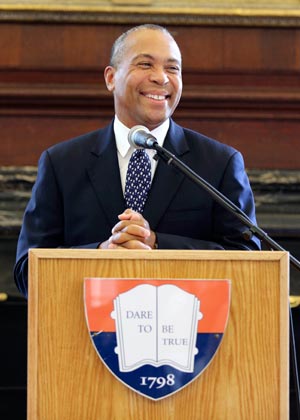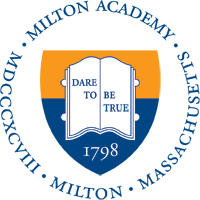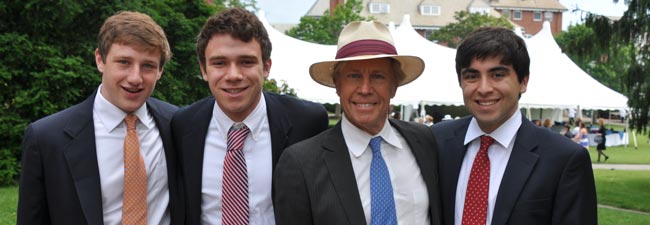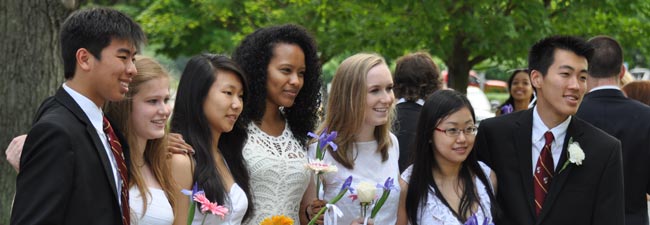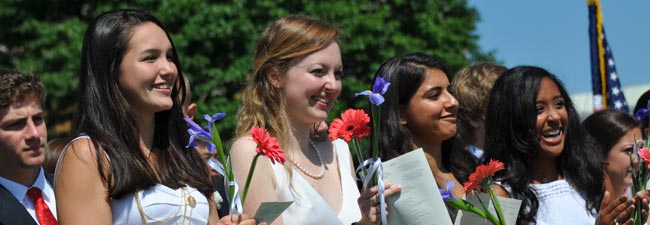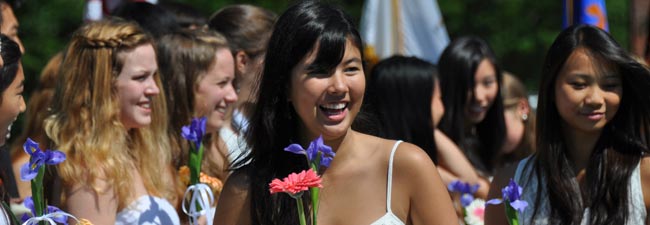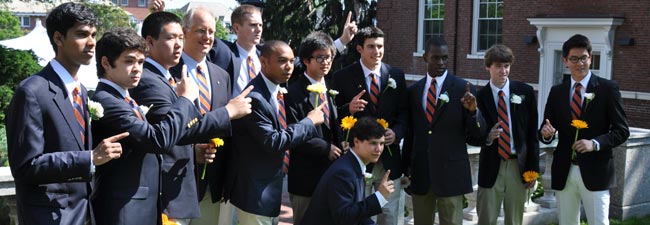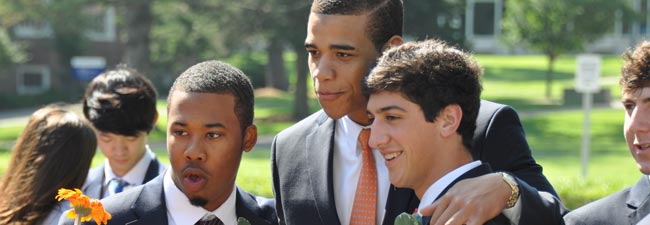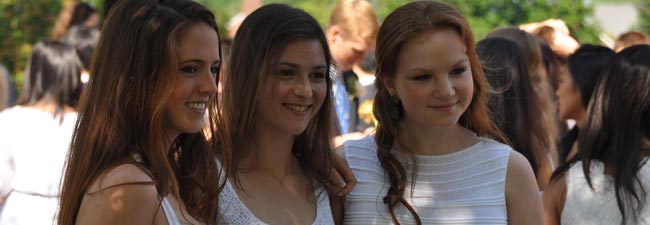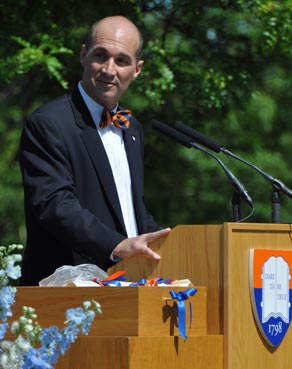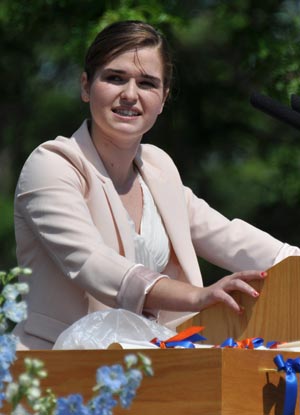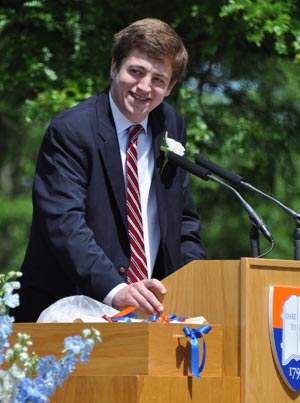Graduation 2012
Graduation at Milton is rich with traditions and favorite rituals many years old — formal and informal. For instance, the longstanding practice of electing the student speakers has assured seniors that they will, at their last Milton gathering, hear a classmate they have chosen. This year, students heard from Cydney Grannan and Martin Page on June 8. Students also like to hear from graduates at graduation. This year, Massachusetts Governor Deval Patrick, Class of 1974, addressed graduates and their class deans prior to the formal commencement ceremony.
Class of 2012 graduates
Babafunso Ayooluwa Akinwunmi, Brockton, MA
Melissa Finley Ambrus, Milton, MA
Henry Oh Arndt, Toano, VA
Hannah Marilyn Auerbach, Canaan, NH
Seth Barnum Wilson August, Boston, MA
Ashley Young-Mi Bae, Pasadena, CA
Nicole Elizabeth Baker-Greene, Milton, MA
Katherine Margaret Ballinger, Scituate, MA
Gordon de Monseignat Batchelder, Vessy, Switzerland
Adam Lawrence Beckman, Newton, MA
Zachary Michael Belnavis, Spanish Town, Jamaica
Elizabeth Jane Bennett, Milton, MA
Maxwell Burgess Bennett, Boston, MA
Arthur David Berman, Riverside, CT
Natasha Ankita Bhasin, Sharon, MA
Gregory Anthony Blaize, Milton, MA
Darryl O. Bobbie, Brooklyn, NY
Phoebe Kate Bodkin, Waban, MA
Eric Stephen Bohn, Dover, MA
Dylan Maxwell Brennan, Montego Bay, Jamaica
Kathryn Margaret Broderick, Hingham, MA
John Patrick Burke, Dedham, MA
Hannah Wilder Cabot, Wayland, MA
Tori Ann Cabot, Holliston, MA
Christine Young Cahill, Milton, MA
Teodoro Michael Camadella, Ithaca, NY
Michaela Elizabeth Carey, Beverly, MA
Jessica Blackwell Carlson, New York, NY
Christian Daniel Castillo, Yonkers, NY
Merilin Castillo, Jamaica Plain, MA
Robin Chakrabarti, Weston, MA
Amelia Kristen Chappel, Milton, MA
Hsuan-Wei Matthew Chen, Taipei, Taiwan
Marion Chen, Burlington, NJ
Victoria Chen, Highland, NY
Tiffany Jin Chien, Hong Kong
Anna Emily Childress, Lexington, MA
Haeyeon Cho, South Korea
Kathryn Lauren Chow, Brookline, MA
Christopher John Chu, Hong Kong
Katelyn Marie Couturier, Westport, MA
Soerny Altagracia Cruz, Jamaica Plain, MA
Carly Michelle Cummings, Sudbury, MA
Deema Abounadi Dahleh, Cambridge, MA
Brandon Dean Daly, Milton, MA
Nathaniel Ghebre Daniel, Randolph, MA
Alaire Martin Davis, New York, NY
Eric Russell Davis, Middleton, MA
Eleanor Tâm-Anh Day, Milton, MA
Nicholas Hoge Deveau, Milton, MA
Kamyra Simone Edokpolor, Milton, MA
Thomas Athanasios Englis, New Canaan, CT
Brooks Albers English, Milton, MA
Sarah Chase Evans, Cohasset, MA
John Christopher Fay, Weston, MA
Sarah Susanne Fishman, Newton Centre, MA
Jesse Daniel Francese, Sharon, MA
Jonathan Ralph Franco, Lynnfield, MA
Danielle Bousquet Frederick, Cohasset, MA
Jared David Friedberg, Milton, MA
Carson Leete Gaffney, Cayce, SC
Nicholas Wood Gagnon, Milton, MA
Jane Rose Ghublikian, Dorchester, MA
Chloe Rose Gianatasio, Marblehead, MA
Molly Beth Gilmore, Milford, MA
Amanda Iselin Gimbel, Andover, MA
Hannah Elizabeth Grace, Weston, MA
Cydney Rose Grannan, Newton, MA
Henry Streit Green, Cambridge, MA
Kiyon Hahm, Irvine, CA
Edward Jungwoon Han, Hong Kong
Edward Otis Handy IV, East Greenwich, RI
Catherine Marie Hartigan, Milton, MA
Tetsuhiro Higuchi, Tokyo, Japan
Sophie Grace Hoffman, West Newton, MA
Devaughn Tasheem Jett Holliday, Brooklyn, NY
Alistair Christman Hutchings, Paget, Bermuda
Byron Colby Martin Hutchison, Kinderhook, NY
Grace Denison Jacob, Milton, MA
Sophie Elizabeth Janeway, Stuyvesant, NY
Jarildy Larimar Javier, New York, NY
Senka Joti, Tirana, Albania
Christine Marie Kalpin, Scituate, MA
Meghan Eleanor Kelleher, Canton, MA
Vincent Churchward Kennedy, Milton, MA
Bin-Na Kim, Phoenix, AZ
Bum Jin Kim, Seoul, South Korea
Do Sung Kim, Seoul, South Korea
Hyun Joon Kim, Seoul, South Korea
Jeong A. Kim, Seoul, South Korea
Juwon Kim, Cheongju-si, South Korea
Megan Myungsoon Kim, Newport Beach, CA
Frank James Kinzie IV, Beverly, MA
Lillie Marie LaRochelle, Milton, MA
Alexandra Joan Lazares, Milton, MA
Matthew Benjamin Lebovitz, Weston, MA
Justin Lap Tek Lee, Hong Kong
Victoria Jones Lee, Milton, MA
Walton Yui To Lee, Hong Kong
Catharine Watson Leffel, Cohasset, MA
Sean Nicolas Leo, Singapore
Karen Renee Li, Arlington, TX
Ruyi Fan Li, Shanghai, China
Karintha Eva Lowe, Shanghai, China
Erin Catherine Martin, Canton, MA
James Delaney McHugh, Sherborn, MA
Louis John McWilliams II, Milton, MA
Brendan Sears Minot, South Hamilton, MA
Caroline Everett Moot, Medford, MA
William Morrow, Jamaica Plain, MA
Victorine Patricia Muse, Milton, MA
Lina Rae Neidhardt, Canton, MA
Eric William Nesto, Weston, MA
Stephanie Tsz Yan Ng, Hong Kong
Tiffany Thanh Nguyen, Milton, MA
Brighid Mary Noone, Quincy, MA
Robert Dominick O’Gara, Nesconset, NY
Rena Ogura, Tokyo, Japan
Mackenzie Irene O’Neil, Duxbury, MA
Bright Osazemhen Osajie, Hyde Park, MA
Adeline Grace Oursler, Cooperstown, NY
Brittany Danielle Owens, Randolph, MA
Martin David Kelley Page, Kingston, MA
Jesse Davis Pagliuca, Weston, MA
Catharine Passavant Parker, Hingham, MA
Henry Worthen Pearce, Milton, MA
Elisabeth Baron Perold, Chestnut Hill, MA
Alexander Bradley Peters, Alexandria, VA
Alexandra Elizabeth Eugénie Polak, Boston, MA
Stewart Robbins Pollock, Houston, TX
Siddharth Shankar Raju, Bangalore, India
Nzingha Emmani Rawlins, Randolph, MA
Penelope Maxim Reichenhall, Walpole, MA
Shannon McNeese Reilly, North Andover, MA
Edward John Gerard Richardson, Wellesley, MA
Anna Lee Roberts, Stowe, VT
Pablo Francisco Royo, Southborough, MA
Joshua Daniel Ruder, Newton, MA
Nicole Odinachi Rufus, Carrollton, Texas
Benjamin Asher Scharfstein, Brookline, MA
Thomas John Schnoor, Brookline, MA
Jay Rahul Sharma, Sharon, MA
Travis Cody Sheldon, Kingston, NY
Regan Christine Santa Ynez Simeone, Milton, MA
Natalie Jane Solomon, Sharon, MA
Akanshu Srivastav, Princeton, NJ
Elizabeth Salee Stanfield, Milton, MA
Gina Micaela Starfield, Newton, MA
Tyler Olin Starks, Milton, MA
Lily Ryan Steig, Jamaica Plain, MA
Alexandra Alice Jane Sweeney Vesty, New York, NY
Sydney Lee Sykes, Milton, MA
McKean Tripp Tompkins, Little Compton, RI
Benjamin Justin Toulotte, Boston, MA
Emilie Caroline Tréhu, Duxbury, MA
Brian Loeber Trippe, Cambridge, MA
Keyon Vafa, Brookline, MA
Jackson Joseph Walsh, North Attleboro, MA
Margaret Mary Walsh, Milton, MA
Chaoyi Wang, Nanjing, China
James Lin Wang, Jamison, PA
Chloe Liane Warren, Cambridge, MA
Samuel Stephenson Wasserman, Milton, MA
Katherine Sophia Wasynczuk, Westwood, MA
Mollie Tarr Welch, Marblehead, MA
Asia Elisa Angola Wells, New York, NY
Zachary James McIntosh Whalen, Dedham, MA
Cary Allain Williams, Milton, MA
Jameson Angelo Williams, Arlington, MA
Skyler Zee Williams, Manchester, MA
Erin Chi Yang, Southborough, MA
Brian Jay Yip, San Marino, CA
Jongwon Yu, Busan, South Korea
Shauna Li Yuan, Brookline, MA
Hanna Melissa Zayas, Wayland, MA
Kimberly Mai Zayhowski, Pepperell, MA
Andy Shenghao Zhang, Hong Kong
Cydney Grannan '12 speech
I met someone this year. My friends thought I was obsessed; I would daydream about our time spent together when we were apart, and when we were together, nothing else could grab my attention. My teachers thought it was unhealthy and distracted from my academics, and it did. My parents thought I had a major crush. But I knew. I knew it was love.
Now, Mom and Dad, my relationship wasn’t with a boy. It wasn’t with a girl, either. It was with The Milton Paper, Milton’s independent, weekly publication. Our six-person editorial board had an energy that surpassed most others I’ve found at Milton. We were driven.
At the end of junior year, when my co-editor Adam Beckman and I had been given our positions, we sat down in Cox Library to discuss our visions and goals for the Paper. It was safe to say we were annoyingly optimistic in what we thought we could accomplish: our fundraising goals, our quality of writing expectations, creating a Web site from the ground up.
Armed with the best and the brightest, we succeeded, somewhat. We added a photography section and formed a layout super team. The fruits of our labors began to show themselves over time.
Now, it’s easy to point to the hours we spent working tirelessly on an issue and say “There, that’s how we succeeded.” But, ultimately, we felt accomplished not because of our sleep deprivation, but because we were happy with our work. Our optimistic attitude was what made us succeed.
We’ve all been swayed by the power of optimism. We like to do what we’re good at, and we’re optimistic when we are bound to succeed. But sometimes optimism can eclipse our lack of experience. We’ve all been shoved out of our comfort zones at one point or another; we’ve all gone into situations ill prepared and unsure. I’ll be the first to say that it’s hard going into something new with a positive attitude, an attitude that not only thinks, but knows, that you can succeed. It should be considered a moment of strength when we bring optimism to tasks for which we have nothing else to offer.
We could not have picked a better environment to learn how to be optimistic, and therefore, how to succeed. We have been able to experiment and fail in a microcosm that picks us up when we lag and awards us for trying.
Our teachers, in particular, fuel our optimism. They hold us to high standards and believe that we will reach their goals. They help us realize that hard work and a positive attitude are both necessary to achieve our desires. When we’ve stumbled, they have picked us up by our suspenders and said, “Do that again, but better, because you can.”
At Milton, we’ve all had that night or two when we think it’s so bad that we can’t continue. Our world crumbles under the English essays that we should have written instead of watching TV, the math homework we are finishing the morning it’s due. But it’s never been so bad that we haven’t tried again. It’s safe to say that most Milton students who have pulled an all-nighter have pulled at least two.
If our teachers or our classmates have taught us anything, it is to always have faith in our optimism, however naïve. Milton has shown us what optimism can offer, particularly in the face of struggle.
I learned this when I joined an elite squad in the fall of my junior year: the JV soccer team. I hadn’t even seen a soccer ball since I was 7, but I was full of myself: how hard can kicking stuff be?
My optimism was the only skill I brought to the team, and it turned out to be a valuable one. I head-butted the ball in every single game, and I always went in assuming I would play better than I had in the last game. The truth is, I would, and I did. I was so bad at soccer that my improvement was easy to track.
Most of you wouldn’t consider this success, and I’m not sure it should be. My intent was simple: to attend all the practices, and to play hard in games. I reached those goals and had a good time, and that’s the best I could do in that new experience.
On a larger scale, being optimistic will be more challenging. But optimism in insignificant situations helps us learn optimism in the significant ones.
It’s easy to say that Milton has coddled us, but that would be de-valuing our experience. Our teachers, advisors and friends have not been proud of us for trying; they have been proud of us for trying with zest. Without optimism, we would not have the passion that defines Milton students. We would not have true success.
Optimism, of course, has to be balanced. On the Paper, our balance was Christine Cahill, a complete realist. We’ve all met a Christine: at first, her failsafe sense of practicality dampens your spirits, but once she has made a clutch decision for the fifth time, you respect her unconditionally.
We would spring lofty ideas to the board: Let’s hold an all-staff meeting tomorrow! Let’s get the Web site finished in October! And Christine, no less optimistic, would say, “Get used to disappointment.” She would point out to whom we needed to speak and what we needed to plan in addition. She would rewrite editorials on cue and consistently balance our lofty goals. She wasn’t naïve. She was our rock, but no less inspired.
It took our October Web site goal to get the site running by February; it took our urge to have a Paper meeting as soon as possible to have the all-staff meeting at all. We reached our goals by balancing diehard optimism and a realistic perspective.
Our parents, our teachers, the board, our fellow graduates and rising seniors look at us and expect greatness, or we suspect that they do.
We deserve these expectations as long as we can look at them knowing we will succeed. We shouldn’t feel burdened—we should feel inspired. Our Milton education is so strong that we don’t have to stray from what we love to “change the world,” however cliché. All we must do is keep doing what we’re doing with dedication and good spirits.
This doesn’t mean that we shouldn’t work harder, because we should. The difference is we won’t have our teachers telling us to do better; we’ll have to rely on ourselves.
Although we may not find or desire an environment as supportive as Milton in the future, we will take snippets from our time here to help guide us. Our attitude is just one of many snippets.
I hope that we will meet our parents’ expectations through our outlooks as much as our actions. More importantly, I hope that we will meet our own; it would be a failure not to. I hope that we don’t lose our zest and that we grab what we want. Just like our diplomas, it’s all within our reach.
Martin Page '12 speech
I’d also like to thank everyone who said, “Marty, you’ll be great. I can’t wait to hear it.” Thanks for taking the pressure off.
Milton teaches us to ask, “Why?” Here are some of the “Whys” I’ve come to ask over the past four years: Why do couples feel the need to snuggle in the Student Center? Why did I ask three girls to homecoming my freshman year? (They all said no, by the way.) And over the past four years, many people have asked me, “Marty, why the hell are you doing that?”
We’ve done a lot in our time here, and I find myself today asking why we all do what we do at this place. Why does The Milton Paper’s board sit for hours on end in the computer lab every Thursday night trying to put together that week’s issue? Why do we work so hard in our classes?
The easy answer is that we do it all to get into college. But if the exclusive, or even primary reason we work hard here is to get into college, I don’t think our experience would be as fulfilling. Leaving here with the idea that my efforts were just to secure my own future, and to please an institution of higher education, is not satisfying. That goal is an important part of our motivation to succeed, but there is a bigger answer. The real answer, and what makes Milton the incredible place that it is, is that we are invested in what we do here beyond ourselves. At our best, Milton is a place of service—not just in terms of community service—but what we do here is, on our best days, in the service of something greater than ourselves.
Starting in the classroom, it’s easy to see that college is a motivator to do well. It motivated me a great deal during my first three years. Before high school I looked to my parents for academic motivation. When I was younger, I didn’t really ask why; I just worked hard because that’s what I was taught to do.
But in high school, and especially as a senior this fall, that motivation became about something more for me. I started to care more about the material. I wanted to do well in Globalization and Islam because I absolutely love studying the Middle East; I wanted to write good papers on James’s novels because those were some of the best books I have ever read. The material was important to me, and Mr. Emmott and Mr. Fricke, my teachers, were important to me. I admire them immensely, and I worked hard for them as well.
This attitude didn’t change this spring, even when the college process was over. I remember Ashley Bae talking during check-in of my Senior Transitions class in April about how she was excited for a big biology lab. As more of a humanities person, I was a little confused by that. But Ashley loves biology, and she was looking forward to spending her senior spring in the lab, just like Adam Beckman was still stressing out about an English paper in the middle of April. Academics still mattered to us, even when the college process was over, because what we do here is meaningful in itself. We aim to do justice to the work we’re assigned.
Milton instills this attitude in us—these values of being passionate about the work we do and the academic exercises we take on. Our teachers care immensely about the subject matter. A few weeks ago I had a conversation with Ms. Dey about the Robert Kennedy campaign and the Vietnam War. There was so much emotion behind her comments, because she was teaching her life. There were moments in Biology when Dr. Eyster’s eyes would grow wider when she said, “Yeah,” and proceeded to explain something about DNA replication. How can we not care about the material when our teachers are so passionately invested?
I’ve talked a lot about investment, and in the words of the nerds and the incredibly attractive women on CNBC, “You invest because you hope for a return.” The return on our investment is doing justice to the material, serving our teachers so that their eyes continue to widen, and we find personal satisfaction from doing a job well. The return isn’t the acceptance letter, but rather the feeling you get when you do something right and have mastered the material you love.
The same themes apply to the activities we do outside the classroom. Last May, many seniors earned leadership positions, and we, as a class, all became leaders of the Milton community. By the end of last year we knew what our jobs would be, and we knew what we could or couldn’t put on our resumes.
On athletic teams, it wasn’t about getting recruited. From what I saw as an impartial, extremely unathletic observer was that you play for something greater. You play for your teammates, your coaches, and your School. You are invested and passionate. You serve.
On publications, it is about supporting each other and the community, as we all choose to stand up for something we believe in. We invest in the Milton community. We serve each other and the School. The staffs of the school newspapers lived for the days when their editorials sparked meaningful discussion on campus.
My ultimate point is this: Milton is a place of invested people. It is so easy to get wrapped up in yourself here. We all have those days when we want to put on a pair of sweatpants and a sweatshirt and not talk to anyone. But we don’t do that. We extend ourselves academically and extracurricularly because we care about our fellow students, the faculty who give us so much, the material we study, and the School we represent.
Those of you who will be back next year: Remember this when you get up in the morning and a vanilla soy latte is the only thing that will get you through the day. Remember you’re working hard to make this amazing place what it is. Continue to serve this place—whether that means working hard in your classes or running for head monitor. Remember why you do what you do.
For those of us departing today, let’s be as invested as we were here wherever we go. Hopefully we’ve all made Milton a better place, and Milton has prepared us to go out into the world. We may not change the world the way many expect us to, but our challenge is to go out into the world with the same energy we’ve brought here and contribute. Give yourself to what you want, but make sure you’re still committed to something greater. Bring the spirit of service with you.
I’ve given you my answer as to why we do what we do here. To all of you here today, continue to ask “Why?” It makes life easier, more enjoyable, and more rewarding to know, on those late nights, why you’re still awake and working. The answer may be an evolving one, but what’s most important is continuing to ask the question and to find an answer that you can be proud of.
Deval Patrick ’74, Governor of the Commonwealth of Massachusetts
